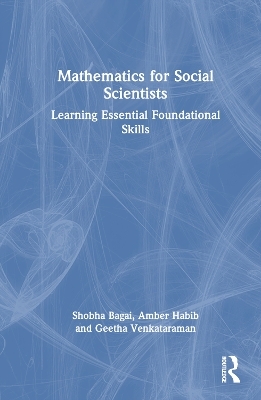
Mathematics for Social Scientists
Learning Essential Foundational Skills
Seiten
2024
Routledge India (Verlag)
978-1-032-80202-2 (ISBN)
Routledge India (Verlag)
978-1-032-80202-2 (ISBN)
This book helps readers bridge the gap between school-level mathematical skills and the quantitative and analytical skills required at the professional level. It presents basic mathematical concepts in an everyday context, enabling readers to pick up skills with ease.
Mathematics for Social Scientists:
• Focuses on building foundational skills in reasoning, data analysis and quantitative methods that are a requisite for progressing to higher levels;
• Helps readers express mathematical ideas in the form of sets, analyse arguments and their validity mathematically, interpret and handle data, and understand the concept and use of probability;
• Includes a dedicated chapter on symmetry, perspective and art to encourage readers to reason, model and objectively evaluate everyday situations.
The volume will be useful to students of various disciplines in Social Sciences and Liberal Arts. It will also be an invaluable companion to practitioners of social sciences, humanities and life sciences, as well as schoolteachers at the middle and higher secondary level.
Mathematics for Social Scientists:
• Focuses on building foundational skills in reasoning, data analysis and quantitative methods that are a requisite for progressing to higher levels;
• Helps readers express mathematical ideas in the form of sets, analyse arguments and their validity mathematically, interpret and handle data, and understand the concept and use of probability;
• Includes a dedicated chapter on symmetry, perspective and art to encourage readers to reason, model and objectively evaluate everyday situations.
The volume will be useful to students of various disciplines in Social Sciences and Liberal Arts. It will also be an invaluable companion to practitioners of social sciences, humanities and life sciences, as well as schoolteachers at the middle and higher secondary level.
Shobha Bagai, Professor, Cluster Innovation Centre, University of Delhi, India. Amber Habib, Professor, Department of Mathematics, Shiv Nadar University, India. Geetha Venkataraman, Professor, School of Liberal Studies, Ambedkar University Delhi, India.
Figures and Tables vi
About the Authors xii
Preface xiv
Acknowledgements xvi
1 Why Solve It? 1
2 Sets 15
3 Logic and Reasoning 59
4 Data Analysis and Modelling 120
5 Probability 188
6 Symmetry 229
7 Perspective: Art and Mathematics 295
Solutions to Selected Exercises 345
Index 386
| Erscheinungsdatum | 10.07.2024 |
|---|---|
| Zusatzinfo | 27 Tables, black and white; 185 Halftones, black and white; 185 Illustrations, black and white |
| Verlagsort | London |
| Sprache | englisch |
| Maße | 156 x 234 mm |
| Gewicht | 910 g |
| Themenwelt | Mathematik / Informatik ► Mathematik ► Angewandte Mathematik |
| Sozialwissenschaften ► Soziologie ► Spezielle Soziologien | |
| ISBN-10 | 1-032-80202-2 / 1032802022 |
| ISBN-13 | 978-1-032-80202-2 / 9781032802022 |
| Zustand | Neuware |
| Haben Sie eine Frage zum Produkt? |
Mehr entdecken
aus dem Bereich
aus dem Bereich
Buch | Softcover (2024)
Springer Vieweg (Verlag)
CHF 62,95
Anwendungen und Theorie von Funktionen, Distributionen und Tensoren
Buch | Softcover (2023)
De Gruyter Oldenbourg (Verlag)
CHF 97,90


